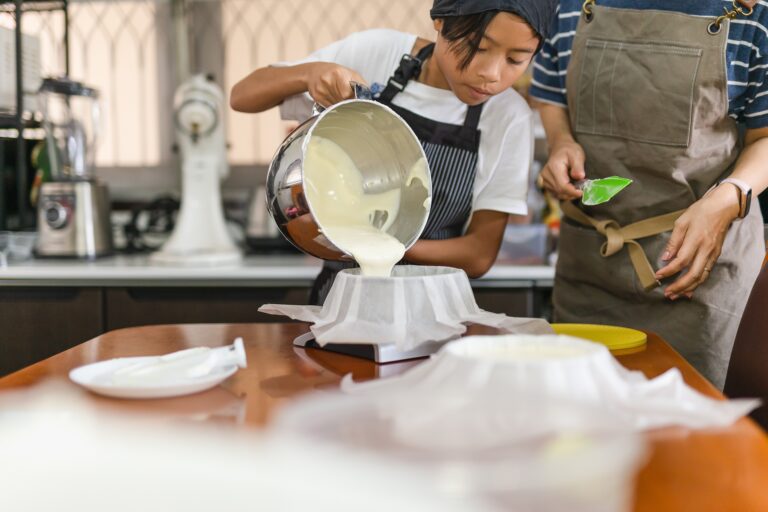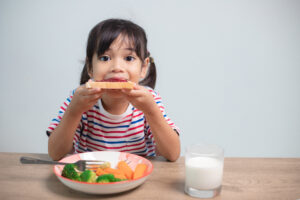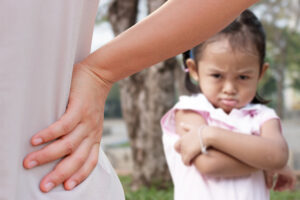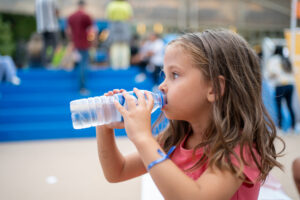Introduction to Cooking Skills for Kids
When we think of essential life skills, cooking might not be the first thing that comes to mind. However, learning to cook is about so much more than just preparing a meal.
Cooking teaches kids valuable lessons about nutrition, responsibility, creativity, and perseverance. Moreover, it encourages them to develop a love for fresh, healthy food that will last a lifetime.
In this article, I will explore the importance of teaching kids to cook, the benefits of cooking lessons in childcare centres, age-appropriate cooking activities for children, tips and techniques for teaching cooking skills for kids, creative childcare cooking lesson ideas, building a culinary-focused childcare curriculum, and encouraging healthy eating habits through cooking lessons.
I will also share success stories of childcare centres implementing cooking programs and the lasting impact that teaching cooking skills for kids can have on their lives.
Importance of Teaching Kids to Cook
Teaching kids to cook is not just about equipping them with a practical life skill. It is also about instilling in them a sense of accomplishment, self-confidence, and independence.
When children learn to cook, they are learning that they have the power to create something from scratch and that they can take care of themselves and others.
This is an empowering feeling that can positively impact their self-esteem and overall well-being.
Cooking also offers a unique opportunity for children to learn about different cultures and traditions.
As they explore new recipes and ingredients, children develop a broader understanding of the world around them and an appreciation for diversity.
This global awareness fosters empathy, tolerance, and respect for others, which are essential qualities for success in today’s interconnected world.
Furthermore, cooking is an excellent way to improve children’s cognitive and fine motor skills.
As they measure ingredients, chop vegetables, and stir mixtures, children are engaging in activities that strengthen their problem-solving abilities, hand-eye coordination, and dexterity.
These skills will serve them well in both their academic and personal lives.
Benefits of Cooking Lessons in Childcare Centres
Integrating cooking lessons into childcare programs has several benefits.
For one, it provides a fun, hands-on learning experience that engages children’s senses and keeps them actively involved in their own education.
Cooking lessons offer a welcome break from traditional classroom instruction, allowing kids to learn through play and exploration.
Cooking lessons in childcare centres also help to create a sense of community among children. As they work together to prepare meals, children learn about teamwork, cooperation, and communication.
They also develop a sense of pride in their accomplishments, knowing that they contributed to something that will be enjoyed by their peers.
Moreover, childcare cooking lessons can help to address the growing issue of childhood obesity.
By teaching children about healthy eating habits from a young age, childcare centres are laying the foundation for a lifetime of healthy choices.
As children learn to cook and appreciate fresh, nutritious food, they are more likely to carry these habits into adulthood.
Age-Appropriate Cooking Activities for Children
When planning cooking activities for children, it is essential to consider their age and skill level.
Younger children can begin with simple tasks such as washing fruits and vegetables, stirring ingredients, or assembling sandwiches.
As they become more confident in their abilities, they can gradually move on to more complex tasks like cracking eggs, measuring ingredients, and using kitchen tools under close supervision.
Preschool-aged children can enjoy activities such as making fruit salad, baking cookies, or preparing simple pasta dishes with supervision.
These activities help to build their fine motor skills and introduce them to basic cooking concepts.
School-aged children can take on more advanced cooking tasks, such as following a recipe, using a stovetop or oven, and preparing more complex dishes.
These activities help to develop their problem-solving skills, creativity, and independence in the kitchen.
Teaching Cooking Skills for Kids: Tips and Techniques
When teaching cooking skills for kids, it is important to be patient, supportive, and encouraging.
Start with simple tasks and gradually increase the level of difficulty as children become more confident in their abilities.
Here are some tips and techniques for teaching cooking skills for kids:
Encourage exploration and creativity: Allow children to experiment with different ingredients, flavors, and cooking techniques. Encourage them to try new foods and create their own recipes.
Teach about kitchen safety: Before beginning any cooking activity, teach children about the importance of kitchen safety. Discuss safe practices for using knives, stovetops, ovens, and other kitchen appliances.
Use visual aids: Visual aids, such as recipe cards with pictures or step-by-step cooking videos, can help children better understand the cooking process and make it more engaging.
Reinforce learning through repetition: Repetition is key to mastering any new skill, and cooking is no exception. Encourage children to practice their cooking skills regularly and provide opportunities for them to revisit and refine their techniques.
Celebrate their accomplishments: Acknowledge and celebrate children’s cooking achievements, no matter how small. This will help to build their confidence and motivate them to continue learning and growing in the kitchen.
Creative Childcare Cooking Lesson Ideas
Looking for some inspiration for your childcare cooking lessons? Here are some creative ideas to get you started:
Theme-based cooking: Organize cooking lessons around specific themes, such as holidays, seasons, or cultural celebrations. This can help to spark children’s interest and make the lessons more engaging.
Cooking challenges: Set up friendly cooking competitions among children to encourage teamwork, problem-solving, and creativity.
Field trips: Organize field trips to local farms, farmers’ markets, or grocery stores to teach children about where their food comes from and how it is produced.
Cooking classes with guest chefs: Invite local chefs or cooking instructors to lead cooking lessons at your childcare centre. This can provide children with a unique learning experience and expose them to new cooking techniques and cuisines.
Family cooking nights: Host family cooking nights at your childcare centre, where children and their parents can work together to prepare a meal. This can be a fun way to bring families together and encourage parents to continue teaching cooking skills at home.
Building a Culinary-Focused Childcare Curriculum
Incorporating cooking into your childcare curriculum requires careful planning and organization. Here are some steps to help you build a successful culinary-focused childcare program:
Assess your resources: Determine what resources are available to you, such as kitchen facilities, equipment, and budget. This will help you plan your cooking lessons accordingly.
Develop a curriculum plan: Create a detailed curriculum plan outlining the cooking skills and concepts you want to teach, as well as the specific activities and lessons that will help you achieve these goals.
Train your staff: Ensure that your childcare staff are knowledgeable about cooking and have the skills necessary to teach and supervise children in the kitchen.
Create a safe and inviting learning environment: Set up a dedicated cooking area in your childcare centre that is safe, clean, and well-organized. Provide child-sized tools and equipment to make it easier for children to participate in cooking activities.
Establish partnerships: Collaborate with local chefs, cooking schools, or nutritionists to enhance your cooking program and provide additional learning opportunities for children.
Encouraging Healthy Eating Habits Through Cooking Lessons
Teaching cooking skills for kids is not just about preparing meals – it is also about fostering a love for healthy, nutritious food. Here are some tips for encouraging healthy eating habits through cooking lessons:
Focus on whole foods: Teach children about the benefits of whole foods, such as fruits, vegetables, whole grains, and lean proteins. Encourage them to incorporate these foods into their cooking and to try new and unique ingredients.
Discuss portion control: Teach children about proper portion sizes and the importance of not overeating. Encourage them to listen to their bodies and to eat mindfully.
Make healthy swaps: Encourage children to make healthier choices by substituting less nutritious ingredients with more wholesome options. For example, they can use whole wheat flour instead of white flour or applesauce instead of sugar in baking recipes.
Introduce the concept of a balanced meal: Teach children about the importance of including a variety of food groups in their meals and how each food group contributes to their overall health.
Encourage family involvement: Encourage parents to be involved in their children’s cooking journey and to continue promoting healthy eating habits at home.
Success Stories: Childcare Centres Implementing Cooking Programs
Across the globe, childcare centres are recognizing the value of teaching cooking skills for kids and incorporating culinary programs into their curriculums.
These programs are having a significant impact on children’s health, well-being, and overall development.
For example, in Australia, a childcare centre called Kids Capers has introduced a cooking program called “Little Chefs” that teaches children about healthy eating, food preparation, and kitchen safety.
The program has been met with enthusiasm from both children and parents, who have noticed improvements in their children’s eating habits and self-confidence.
In the United States, a preschool in New Jersey called The Learning Experience has implemented a cooking program called “Yummy in My Tummy,” where children learn about nutrition and meal preparation through hands-on cooking activities.
The program has been a hit among children, who are excited to share their newfound cooking skills with their families and friends.
In the UK, a nursery called Little Forest Folk has incorporated cooking lessons into their curriculum, where children learn about different cultures and cuisines and develop their cooking skills.
The program has been a huge success, with children showing a greater interest in food and healthy eating.
These success stories demonstrate the positive impact that teaching cooking skills for kids can have on their lives. By introducing children to the joys of cooking and healthy eating at an early age, childcare centres are setting them up for a bright and healthy future.
Conclusion: The Lasting Impact of Teaching Cooking Skills for Kids
In conclusion, teaching cooking skills for kids is an essential life skill that can have a lasting impact on their physical, emotional, and social development.
By introducing cooking lessons into childcare curriculums, we are giving children the tools they need to make healthy choices, develop their creativity and problem-solving skills, and build self-esteem and confidence.
Through age-appropriate cooking activities, creative lesson ideas, and a culinary-focused curriculum, we can create a fun and engaging learning environment that inspires children to learn, grow, and thrive.
By encouraging healthy eating habits and promoting a love for fresh, nutritious food, we are helping to shape a healthier, happier, and more vibrant future for our children.
So, let’s start teaching cooking skills for kids today and give them the gift of a lifetime of good food and good health.












